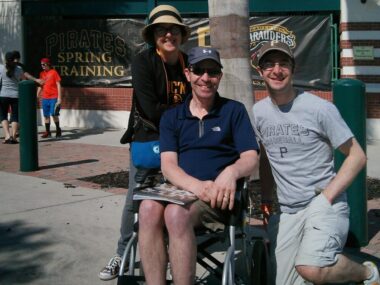Web Portal That Detects Cognitive Changes via Language Tests Detailed in Study
Written by |

A new web portal called Talk2Me that detects early changes in language could help doctors diagnose or determine progression in neurodegenerative disorders like multiple sclerosis (MS), the scientists who created it suggest.
The open platform portal, which gathers language data through an array of cognitive tasks performed on a computer or tablet, was described in the article, “Talk2Me: Automated linguistic data collection for personal assessment,” published in the journal PLOS ONE.
As many as 1 in 10 people in North America – including many of the more than 7 million people with neurodegenerative diseases like MS, cerebral palsy, and Parkinson’s disease – have some kind of speech disorder, the researchers said. As the population continues to age, this number is only expected to increase, enhancing the need for effective diagnosis and treatment.
Testing language skills could help in the early detection and diagnosis of neurodegenerative diseases, as speech disorders are one of the first signs of cognitive decline as a person ages. Typically, a physician now assesses patients for changes in language using a pen and paper. However, this method is imprecise and prone to bias.
Talk2Me is intended to replace this imprecision with machine learning. Developed by researchers at the University of Toronto and elsewhere in Ontario, it collects data using tasks similar to those used in standard assessments of cognition, with participants giving responses by typing or speaking.
“It’s an exciting time, now, where artificial intelligence can make a real impact in healthcare,” Frank Rudzicz, an associate professor at the University of Toronto and the study’s senior author, said in a press release.
“Talk2Me will help enable a community of people to solve problems related to neurodegenerative issues, cognitive issues and psychiatry,” Rudzicz said. “It’s a common, open platform to help solve these problems.”
As an example of the kind of tests administered, patients might be given the statement, “The trophy could not fit into the suitcase because it was too big,” and then asked, “What was too big, the trophy or the suitcase?” Responding that the suitcase was too big could be indicative of impaired cognitive function, and changes in the person’s ability to answer properly over time could indicate age-related dementia.
Other tasks on Talk2Me include picture description, which is just what it sounds like – participants are asked to describe an image or scene presented to them. Participants also might be asked to type as many words as they can think of in a category, or to say the color of text for written words. For example, for the word “green” written in red letters, the correct answer would be “red.”
Different tasks involve different mental processes, and the software can analyze many factors, including number of words used, grammatical complexity, and the presence of filler words, such as “like” and “uh,” to make an assessment of language skills.
The researchers’ goal is to apply language processing and machine learning to healthcare. “We want to change lives for the better and improve outcomes,” Rudzicz said.
They are also continuing to test their platform and have “developed a public portal for ongoing longitudinal language data collection from a naturalistic population,” that includes a software package for further studies, the team notes in the study’s conclusion.

